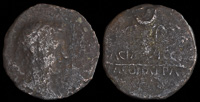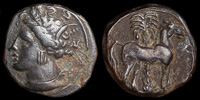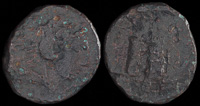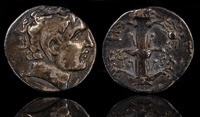Africa
Death of Battos I of Kyrene. His son Arkesilaos I becomes king and accomplishes nothing that we remember.
Death of Arkesilaos I of Kyrene. His son Battos II takes power who keeps the sovereignty of Kyrene over Egypt.
The indigenous Libyans ask Pharaoh Apries for help against the Greeks in Kyrene. He is defeated at the Battle of Irasa.
Death of Battos II of Kyrene. His son Arkesilaos II takes power and oversees the decline of the dynasty.
Arkesilaos II of Kyrene is strangled by his advisor Learchos, who is then killed when he returns to the city to become king. Battos III becomes king.
Battos III of Kyrene makes a pact with Pharaoh Amasis II. Amasis marries his daughter Ladike.
Euhesperides founded by settlers most likely from Kyrene.
Arkesilaos III of Kyrene makes a pact with Cambyses II of Persia.
Death of Pheretima, ruler of Kyrene. Battos IV, son of Arkesilaos III, takes over.
Carthage signs its first known treaty with Rome, delineating spheres of influence and trade routes.
Death of Battos IV, king of Kyrene, which became a client kingdom of Persia during his reign. Leadership falls to his son, Arkesilaos IV.
Arcesilaos IV achieves victory in the chariot race at the Pythian games, and uses the victory to encourage settlers to Euhesperides.
Arkesilaos IV, king of Kyrene, wins a chariot race at the Pythian Games in Delphi.
The unpopular Arkesilaos IV and his son are killed and beheaded by citizens of Kyrene, which ends the Battiad dynasty.
Euhesperides is besieged by Libyan forces under Nasamones.
Spartan forces travelling to Sicily are taken by winds to Kyrene, who gives them ships to return.
Hannibal Mago (a general and political leader) expands Carthaginian territories in Sicily, initiating a new wave of Carthaginian influence on the island.
Approximate year that Ariston takes control over Kyrene and kills 500 prominent citizens.
Messenians sent away from Naupaktos travel to Kyrene and join in the effort against Ariston, but most are killed.
Caesarea in Mauretania founded by settlers from Carthage.
The general Himilco of Carthage concludes a treaty with Kephaloidion.
Timoleon of Syracuse drives Carthaginians out of Akragas and declares it a free city.
Kyrene sends offers of friendship to Alexander the Great in Egypt, but do not come under Macedonian control.
326 BCE
The Spartan mercenary Thibron gathers exiles from Kyrene in Cretea and takes the city. However, one of his officers defects to the other side and he is ousted. Euhesperides supports him.
Thibron returns to Kyrene and takes it again.
Outbreak of the Agathokles War: The tyrant Agathokles of Syracuse invades North Africa, threatening Carthage but is ultimately repelled.
Agathokles‘ conflict with Carthage escalates. Agathokles faces a major invasion by the Carthaginian general Hamilcar, who besieges Syracuse. In a daring move, Agathokles decides to strike back by invading North Africa.
Agathokles launches his expedition to North Africa, landing near Carthage. His unexpected attack catches the Carthaginians off guard, and he achieves several victories on African soil. Agathokles declares himself king of Sicily during this campaign, marking a significant shift in his ambitions.
Agathokles persuades Ophellas of Kyrene to join him as an ally against Carthage. Agathokles at first receives him warmly, then attacks his camp unexpectedly, kills Ophellas, and claims his troops.
Marriage of Demetrios Poliorketes to Eurydike, an Athenian noblewoman and the widow of Ophellas of Kyrene.
Magas refuses to submit to Ptolemy II Philadelphos and declares himself king of Kyrene.
First Punic War begins between Rome and Carthage over control of Sicily.
261 BCE
Roman troops near Thermai Himeraiai are attacked by Carthage under Hamilcar and defeated.
Euhesperides is relocated and renamed to Berenike.
Hamilcar Barca begins the Carthaginian expansion in Iberia (Spain), establishing a base for Carthage’s later campaigns.
Carthaginian general Hannibal attacks Saguntum in Iberia, leading to the Second Punic War with Rome.
Battle of Cannae: Hannibal of Carthage defeats a large Roman army, inflicting one of Rome’s worst defeats.
Battle of Zama: Roman general Scipio Africanus defeats Hannibal in North Africa, ending the Second Punic War. Carthage is forced to surrender and pay heavy reparations to Rome.
Kyrene is established as a separate kingdom by Ptolemy VIII after he is banished.
Third Punic War begins after Roman accusations of Carthaginian breaches of treaty terms.
Destruction of Carthage: Roman forces led by Scipio Aemilianus capture and destroy Carthage, ending the war. The city is burned, and its survivors are sold into slavery.
The Roman Senate authorizes the establishment of a new Roman colony, Colonia Junonia, on the site of Carthage, though it is soon abandoned.
Kyrene becomes part of the Roman Empire.
Kyrene receives its first Roman governor, Publius Cornelius Lentulus Marcellinus.
Julius Caesar refounds Carthage as Colonia Julia Carthago, establishing it as a Roman colony and initiating new construction.
Approximate year when Juba II and Kleopatra Selene settle in Caesarea in Mauretania.
A rebellion starts in Caesarea in Mauretania after the Numidian king Ptolemy is murdered by Caligula.
The rebellion in Caesarea in Mauretania is quelled by Claudius and the province is split into two.
A massive Jewish revolt breaks out in Kyrene. Nearly all of the city’s buildings are destroyed.
Emperor Septimius Severus, a native of North Africa, grants Carthage additional privileges, marking it as a prominent city within the Roman Empire.
Much of Kyrene is destroyed by an earthquake.
July 21
An earthquake destroys Aptera, Gortyna, Eleutherna, and Knossos on Crete. Alexandria is devastated by a tsunami, and Kyrene is also affected by the same tsunami. Kydonia is also damaged. In the Peloponnese, Messene is affected.



